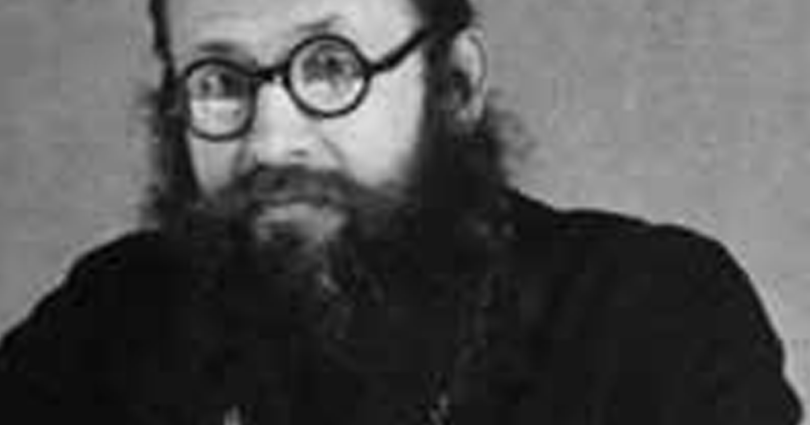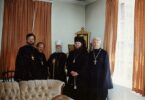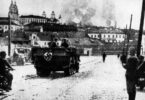The following letter appeared in Vestnik Russkogo Khristianskogo Dvizheniia no.116 (1975) in response to N. Zernov’s article “Disputing Authority Among Russian Ecclesiastical Emigres at 1st Pan-Diaspora Council in Karlovci” (“Iurizdiktsionnye spory v Russkoi Tserkvi v emigratsii i 1-yi vsezarubezhnyi Sobor v Karlovtsakh v 1921 godu”) which appeared in no. 114 of the same publication. This translation was sponsored by an anonymous.
Letter to the Editor Regarding N. M. Zernov (excerpts) and N. Zernov’s Response
Archpriest George Grabbe
Attributing the division to personal scores on the part of one side (between whom?), N. M. Zernov sees behind them “much more significant differences.” He regards these differences along the line of differing definitions of the relationship between Church and state. But as he writes further on, “individuual hierarchs represented definite orientations, both political and ecclesiastical, and sympathizers grouped around them not only according to personal likes, but according to theological convictions as well.” (p. 119) But he writes nothing about these theological convictions and sees the division only along the line of “differing definitions of the relationship between Church and state.” This is undoubtedly where N. M. Zernov’s error lies. The division at the Council occurred only along the line of the monarchy issue, but very soon a much deeper division took shape along the line of that “third party” about which N. M. Zernov writes: “It found its ideologists later, for the most part among such religious thinkers as Bulgakov, Berdyaev, and Fedotov, who were banished to the West by the Soviet Government in 1922 or left Russia even later.” (p. 124) Only it is is unclear whom he has in mind when he says that “at the Council they supported Bishop Veniamin.” To be frank, looking through the list of Council members, I don’t know who could be placed in this category. But the significance of these exiled professors and of those who were sympathetic to their theological orientation in the 1926 division is absolutely doubtless, and N. M. Zernov is correct in mentioning them.
Thus N. M. Zernov disagrees, as we do, with Solzhenitsyn’s interpretation that the current division has been brought about by arguments “not about nuances of faith, and not even about ritual, but because of some kinds of jursidictions.”
But, focusing only on the Church-state issue, N. M.Zernov, in his interpretation of the division’s basis, proceeds from the following scheme that he put together: that ROCOR represents the spiritual heirs of St. Joseph of Volokalamsk who wish to forcefully stifle those who disagree, while their opponents are followers of St.Nilus of Sora, who avoided the state and was kind to heretics and dissidents.
It seems to me that such historical parallels are always very conditional and rarely bring about clarity. In this case the parallel does not apply to our conditions at all.
In the days of St. Joseph there was no problem of dealing with a heterodox, and especially with an atheistic, state. He had before him an Orthodox grand prince. The problem of the Church’s relationship to a different state in Russia arose for the first time only before the All-Russian Council in 1917. In solving it the Council, we could say, was groping its way. It didn’t immediately assimilate the idea of the Church’s existence in a heterodox state.
Putting aside the artificial scheme according to which N. M. Zernov places ROCOR and the Moscow Patriarchate into the ranks of Josephites, let us see how accurately he presents our Church’s views.
N. M. Zernov writes the following about us: “They believe in the possibility and necessity of restoring holy monarchy, they do not conceive of the Church apart from a union with the state, they do not separate one from another, and therefore they term the Moscow Patriarchate as fallen away from Christ,
since it has entered into agreement with a satanic power.” (p. 122)
On the basis of what evidence has this formulation been made? To what extent does it correspond with reality? He cites only the Council’s message, issued 54 years ago. The fact that he has quoted it in full gives him credit. But he is writing in the present, and so such an old document can hardly be regarded as sufficient.
I think that I can say without excessive humility that I am a sufficiently graphic spokesman for ROCOR’s views and therefore I will allow myself to repeat I had expressed in response to some very similar statements by Archbishop John Shakhovskoi.
A person can theoretically find salvation in any conditions and in any form of government. However, it is easier for an Orthodox way of life to develop under certain conditions, and harder under others. Thus, in her concern for the salvation of her children the Church does not remain indifferent to those conditions of socio-public life which these children create for themselves. This is not an issue of dogma, but one of pastoral expediency. However, the Church does not create a governmental apparatus or even a system, but only brings up those who comprise it through her influence. This is why the hierarchy cannot immerse itself in purely political arguments of parties. As everything that is man-made, not a single form of government can be recognized as being perfect absolutely and under all conditions. And yet in certain cases the Church can point out to her children a governmental route that is expedient and more favorable for the salvation of one’s soul. Excluding the whole area of political and community life from the field of pastoral guidance would mean limiting the Church in the performance of the task of pastoral service which lies before her in connection with moral influence upon the public.
These principles were expressed in the opinions of the All-Russian Council, and were accepted by both the majority and minority at the First Karlovci Council. No one mentioned the Josephites at either Council.
However, this is a far cry from not conceiving the Church apart from a union with the state, as N. M. Zernov writes, and he doesn’t even indicate with which state. I don’t know anyone who thinks that way.
Union is not possible with every state. The All-Russian Council became convinced of this when it tried to conduct negotiations with Soviet commissars not even about a union, but about coexistence and recognition of certain rights possessed by the Church. The negotiations by the Council delegation, headed by A. D. Samarin, were fruitless. (Action of March 15/28, 1918) Union with an enemy is impossible. Life demonstrates also that peaceful coexistence is not possible with anyone who is dead set to destroy you. Peaceful coexistence of Christ and Belial, the Church and Antichrist, is impossible.
For the Church, union is possible only with a state that recognizes itself as Orthodox and for which it is most natural to have a monarchy. But an Orthodox monarchy is possible only with an Orthodox population. Thus, we cannot expect an Orthodox monarchy in Russia and its union with the Church until a religious rebirth of the Russian people takes place. We can apply here Our Savior’s instruction: “Seek ye first the kingdom ofGod and his righteousness, and all these things shall be added unto you.” (Mt: 6:33)
This is precisely how the question was put in the response by the Second Karlovci Council in 1938 to the greeting from Grand Duke Kirill Vladimirovich. It mentioned that “The Council sends up a fervent prayer to the Most High for the restoration of complete spiritual and national unity on the basis of ancient Holy Russia. Only it can lead to the restoration of the Russian Sovereignty, headed by an anointed Tsar, upon whom the Church’s prayers and blessing will rest.” (Acts of the Second All-Diaspora Council, Belgrade, 1939)
If Communism would fall in Russia, Church’s relationship with the government would develop according to its attitude to the Church. In general, the Church-state relationship is not a dogmatic issue, and is considered one way or another not independently of the quality of the ruling power, but according to its character.
At the Karlovci Council Archbishop Anastasii, with his characteristic objectivity, reported to the Council both viewpoints of the members of the Section on the Spiritual Rebirth of Russia. He pointed out that there was an unquestionable shift in the minds of the Council members who had disagreed with the final edition of the message and who originally did not wish to deal with the monarchy issue at all.
Here is what he said:
Gradually shifting from a theoretical and abstract viewpoint toward the indicated topic to the area of living realistic life they could not fail to see that the Church, as a fact of history, lives in conditions of space and time. She is like Jacob’s ladder, with her top going off into the heavens, and yet her base is firmly established on earth, bestowing a blessing of grace upon all aspects of human existence… And so, the testaments of the early
builders of the Russian land happened to speak up in us… we beheld the vivid image of that solid rock of Orthodoxy, Saint Germogen, which moved us, precisely as a Church body, to have our say regarding the necessity of restoring tsarist rule in Russia. And we had this say in total unanimity of spirit and voice.
Thus the disagreement took shape around just one issue, which was the appeal to pray that God “return a lawful tsar from the House of the Romanovs, anointed and strengthened by the people’s love.”
N. M. Zernov is correct that this act should be evaluated in light of the situation and mood that existed at the time.
Just a year had passed since the defeat of the White Army in the south of Russia. Four years had passed since the Revolution. The Council members had all probably sworn allegiance to the tsar and his lawful heir in their day. They could have had a sharper sense of national guilt for the Revolution than our current generations. This sense found its expression in the penitential tone of the Council message. But, not having been a member of the Council and looking over this issue now, I have come to a conclusion which might surprise readers and seem paradoxical.
Let me explain. The minority, judging from its written statement and Archbishop Anastasii’s words, accepted the monarchy as the best form of government for Russia. From such a perspective this is an issue of governmental and political expediency. Insofar as this approach excludes the issue of loyalty to or betrayal of an oath it remains in the realm of political doctrine, which can be treated one way or another outside the religio-moral sphere. With such an approach a recognition of the people’s guilt for the Revolution can be totally absent. On the contrary, when the subject is the betrayal of an oath which was made not to a form of government but personally to the tsar and his lawful heir, it is a relgio-moral concept. The assimilation of such a recognition and nation-wide repentance could really bring about spiritual healing of the nation and its rebirth, and calling for it was a logical fulfillment of the idea of monarchy which was gradually accepted by all of the Council members in the course of deliberations. Vladyka Anastasii mentioned this in his speech, but the religio-moral aspect of the matter partially escaped him. It seems that everyone saw the people’s guilt in causing the disaster, but the minority didn’t wish to specify its essence.
Of course, this call from Sremski Karlovci, especially when weakened by objections from the opposition, could not acquire all-Russian forcefulness. It was being soon forgotten even by those who raised and defended it at the Council, and when such a confession is attributed today to all of ROCOR as its main characteristic, it sounds anachronistic. Not counting the commemoration of the murdered Royal Family on July 4/17 and the establishment of a fast on that day, I cannot recall any corresponding determinations by our councils and the Synod. N. M. Zernov would never find their statements “on the restoration of holy monarchy.” It was totally unexpected to me that, having become engrossed in his scheme regarding Josephites, he started formulating guesses that in case of our access to power we “would probably find ourselves in the right to resort to force.” It’s a far cry from canonical means of chastisement to the use of force. I believe that once he looks closely at what he has written, N. M. Zernov himself will regret it, for I imagine that it is not in his nature to consciously display unfairness.
Relying on his reminiscences that are colored by one-sided impressions, N. M. Zernov commits a series of factual errors which I would like to point out.
He says a great deal about “a series of members of the Supreme Monarchist Council” who were supposedly invited to the Council by Metropolitan Antonii. This does not correspond to reality. Personally, in line with his duties as Director of Russian Orthodox Communities in the Kingdom of Serbs, Croats, and Slovenes, he invited two persons — Professor Shcherbakov and Nemirovich-Danchenko. I know little about the latter, but the former was deeply involved in the Church and was not a political activist. I think that N. M. Zernov might remember him from Belgrade.
N. E. Markov really was invited by the Supreme Church Authority, but not personally by Metropolitan Antonii. But this Authority invited persons of rather diverse views, who had absolutely no connection with monarchist organizations. Such were N. N. L’vov, P. P. Izvol’sky, Archpriest M. Slutsky, V. D. Evreinov, Archpriest P. Belovidov, Professor Troitskii, Professor Novgorodtsev, and others. N. E. Markov was the only member of the Supreme Monarchist Council who was present, but there were also a few monarchists who were not in the indicated Council, and certainly were not “its prominent members.” This make-up was a far cry from party-based selection. Such prominent monarchists as A. N. Krupenskii and A. M. Maslennikov were invited not by Metropolitan Antonii but by Metropolitan Evlogii. A. A. Trepov was elected to represent France. It is indicative that the address by Nenarokomov (not Nikanorov, as Zernov wrote erroneously), a member of Bishop Veniamin’s Parish Section group, contained an indication that the Church should be outside politics and not dependent upon government was adopted unanimously.
On page 128 Gen. Batiushkov should be Batiushin. On the same page Priest Krakhmalov should be Krakhmalev. On page 129 M. V. Rodzianko was not Vasil’evich but Vladimirovich. On page 131 Krupenskii was A. N., not A. P. Pisarchik should be Pisarchuk. On page 132 the greeting was not from an archimandrite, but from the Director of the Russian Spiritual Mission in China, Bishop Innokentii.
On page 137 N. M. Zernov notes that all of the speeches by opponents of Bishop Veniamin were entered in the minutes in full, but his were not. However, Secretary Golikov had explained at the same meeting about which Zernov writes this that in order to enter speeches more completely into the minutes, speakers should submit them in written form, and this gets approved by the meeting. Three days later Golikov himself reported to the Council that he had reminded Bishop Veniamin about submitting a written speech, but never received it. Because of this, the Secretariat was not able to present a complete set of minutes to the Council. Thus it is clear that the problem was in the recording method, rather than in a premeditated unwillingness to enter a written speech.
Response to Archpriest George Grabbe
N.M.Zernov
Dear Father George,
Many thanks for your valuable criticism of my article and for all the factual corrections. As you write yourself, I wasn’t writing the Council’s history, but only my youthful impressions of it, which were, naturally, one-sided in many ways.
My attempt to link the arguments in the diaspora to arguments between Josephites and Non-Possessors does not assume, of course, historical identity, and your objections are fully justified.
But I would like to dwell upon two major objections. You accuse me of making an unsubstantiated claim that for the Synodal Church’s sympathizers there exists an organic link between Orthodoxy and Holy Monarchy and that many of them regard the restoration of tsarist rule in Russia as one of the missions of the Church. I cannot provide an example of a synodal ruling on this topic, but I know many friends who share this view. Personally, I also feel that a popular monarchy is the most desirable form of government for Russia. Regarding your second accusation, that I attribute to certain members of the Synodal Church a readiness to resort to forceful means to suppress heresy or ecclesiastical disobedience, I consider it necessary, to my regret, to confirm this conviction. The Revolution hasn’t taught us to regard any compulsion in religious life to be unacceptable. Among us there are still many people who, if they would be in power, would regard it as their duty before the Church to use police methods to put an end to Baptist or Uniate propaganda among the Orthodox. That atmosphere which came with Metropolitan Evlogii’s suspension and with the declaration that sacraments performed by his clergy were invalid was totally infused with a spirit of the kind of intolerance which was replete with force, although in this case it was moral, not physical.
I don’t know how you regard these events of the distant past nowadays. They appear to me as a fatal error, but also as a sin before our Church. Breaking a sacramental relationship is the most extreme measure which is applicable only to unrepentant heretics, while the Synod applied it to involved canonical disputes, and without enlisting support from other Orthodox Churches. I am very hopeful that Solzhenitsyn’s appeal will have its beneficial effetct. The time for total jurisdictional unity hasn’t come yet, but it is time to lift all of the prohibitions, which have lost all credibility.
I would like to believe that there is a possibility of mutual understanding between our tragically divided Churches. The benevolent tone of your article is a token of this for me.
I ask for your pastoral prayers,
Nicholas Zernov
Day of St. Seraphim, Wonderworker of Sarov, July 19/August 1, 1975
- Русская Православная Церковь Заграницей (Москва) http://rpczmoskva.org.ru
Links/ Ссылки:
Yuri P. Grabbe, Did St Cyprian Change the Doctrine of the Church?








